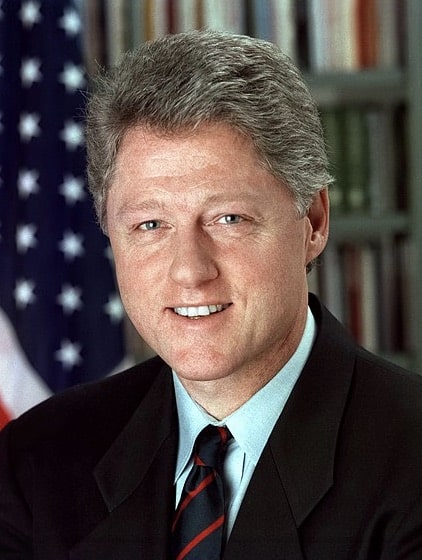
William Jefferson Clinton, was born on August 19, 1946, in Hope, Arkansas. He was raised in Hope and later in Hot Springs, Arkansas, emerging out of a modest background. His father died before he was born, and his mother was a nurse anesthetist. Clinton showed an early interest in politics and public speaking, eventually earning a Rhodes Scholarship to study at the University College, Oxford. At this time, the U.S. was engaged in Vietnam so, Clinton did not expect to return for the second year because of the draft. He switched programs, receiving an offer to study at Yale Law School and left early to return to the United States and did not receive a degree from Oxford.
At Yale Law School, he met his future wife, Hillary Rodham. His political career began in his home state of Arkansas, where he served as Attorney General of Arkansas from 1977 to 1979 and as the state’s governor from 1979 to 1981 and again from 1983 to 1992. His time as governor was marked by a focus on education and economic growth. He gained national attention for his pragmatic approach to governance and his ability to work across party lines.
In 1992, Bill Clinton ran for the presidency as the Democratic nominee. His campaign focused on economic issues, promising to tackle unemployment and stimulate economic growth. He won the election against incumbent President George H.W. Bush and independent candidate Ross Perot, becoming the 42nd President of the United States.
Clinton’s presidency was marked by a period of economic expansion, with low unemployment rates and a federal budget surplus during his second term. However, his presidency was also marked by controversy, including the Monica Lewinsky scandal, which led to his impeachment by the House of Representatives in 1998. He was subsequently acquitted by the Senate and completed his second term in office.
After leaving the presidency in 2001, Clinton remained active in public life through his work with the William J. Clinton Foundation (later renamed the Clinton Foundation). The foundation focused on various global initiatives, including public health, climate change, and global development. He also engaged in philanthropic efforts and played a role in disaster relief efforts, particularly after events like the Indian Ocean tsunami in 2004 and Hurricane Katrina in 2005.
Bill Clinton’s presidency is often remembered for its economic prosperity and his efforts to balance the federal budget. He is also known for playing a role in the Oslo Accords, which aimed to bring about peace between Israel and Palestine. His personal charisma and political acumen have contributed to his lasting influence on the Democratic Party and American politics as a whole.
